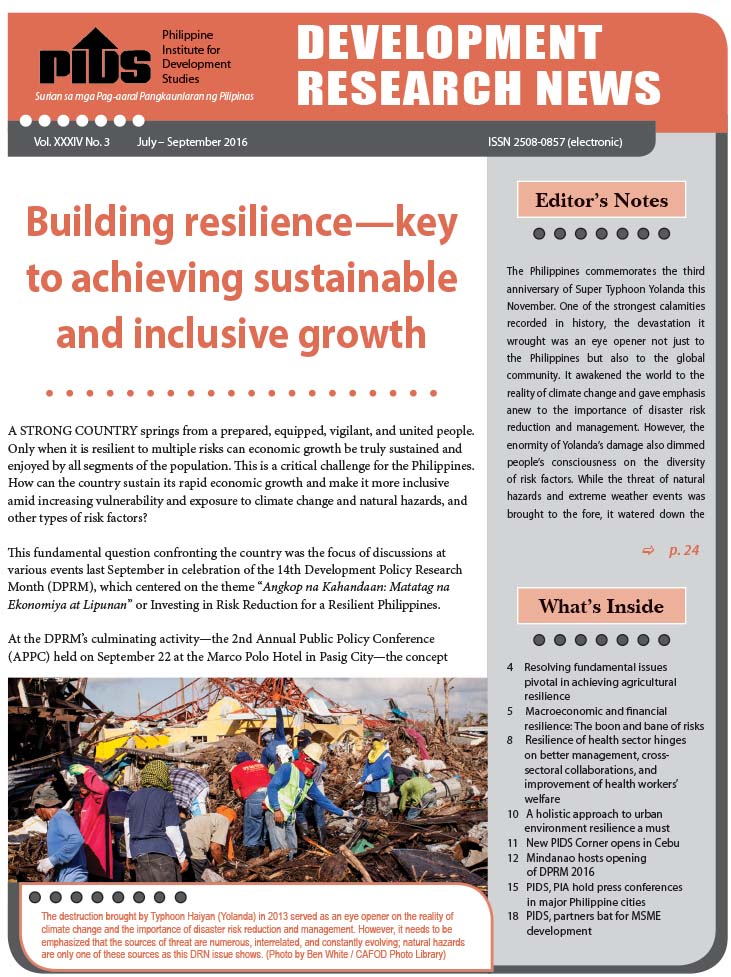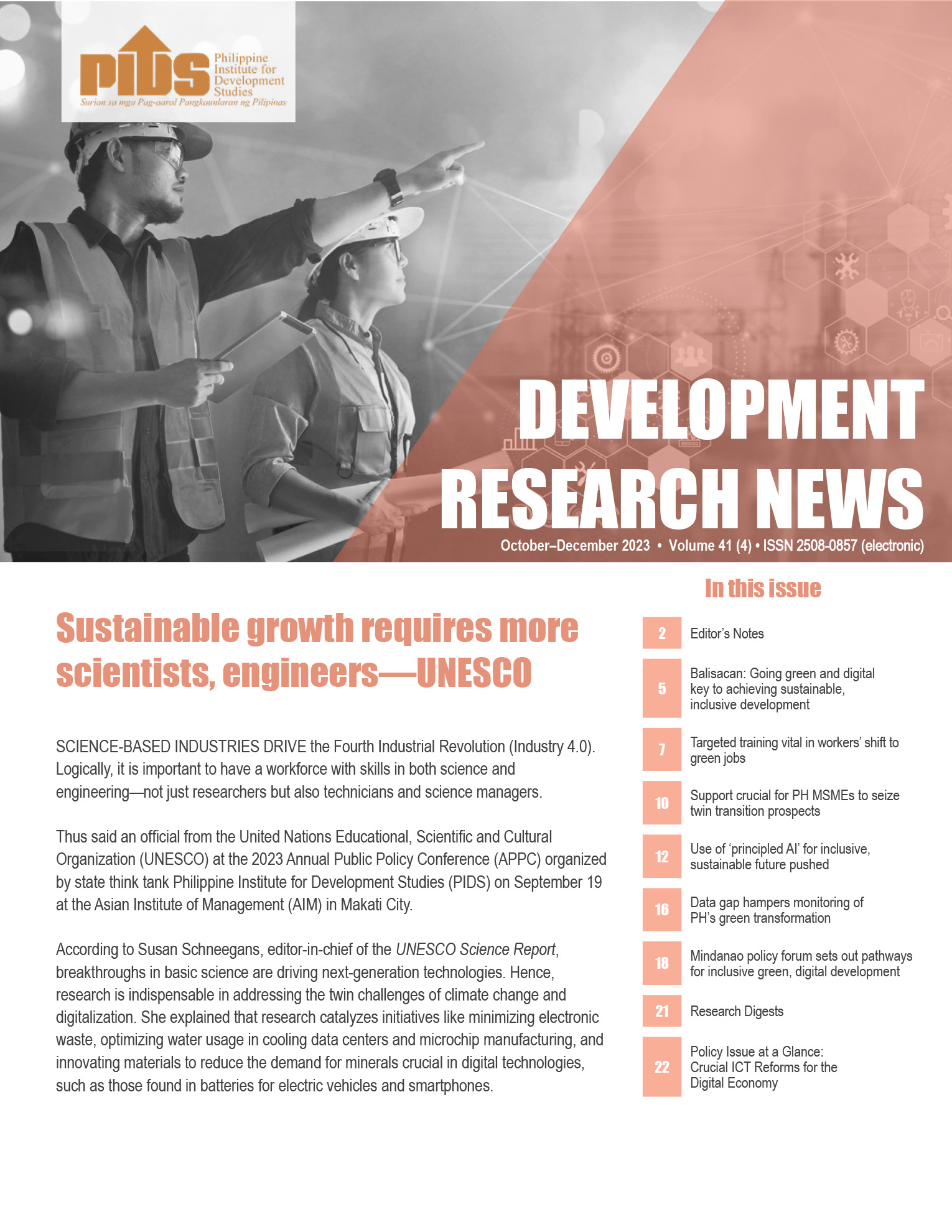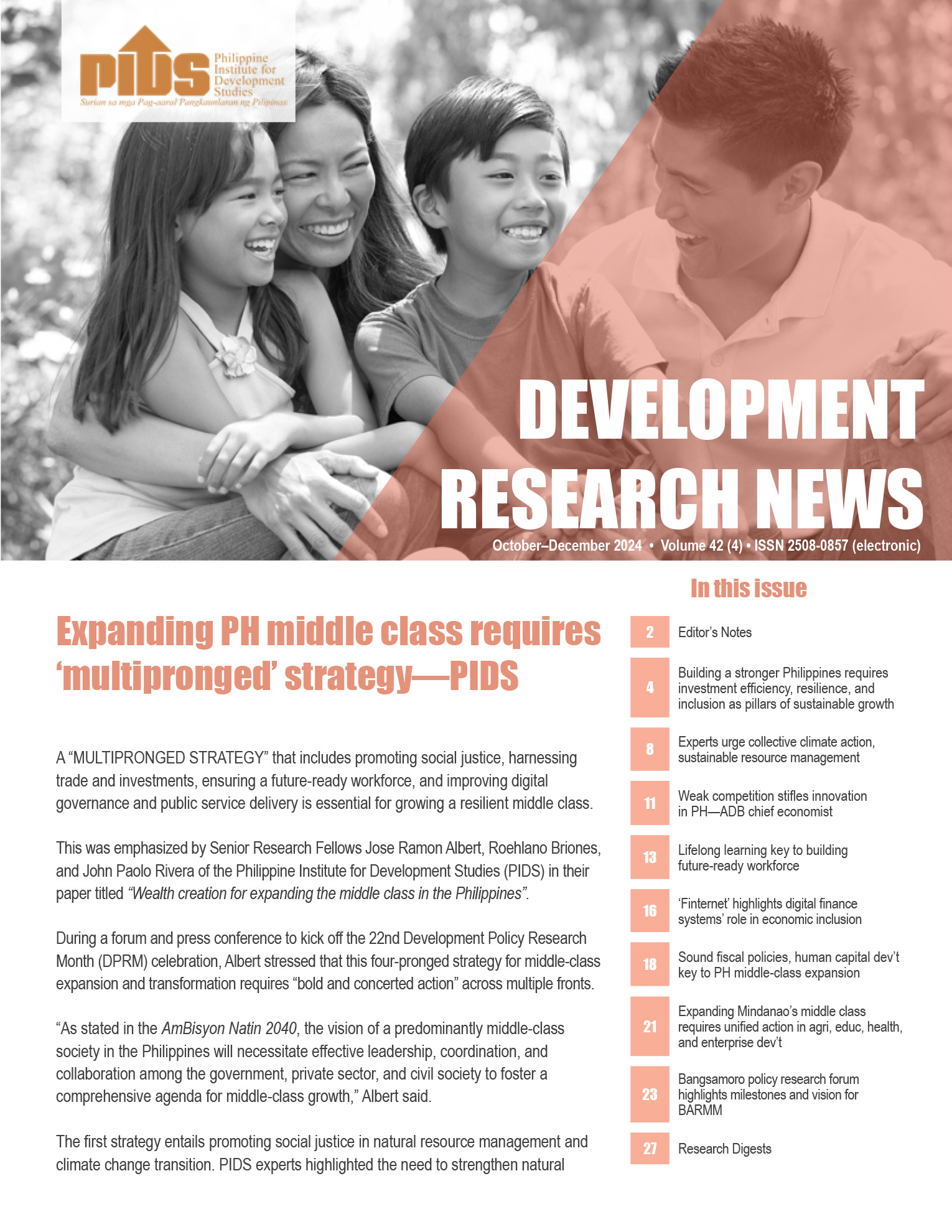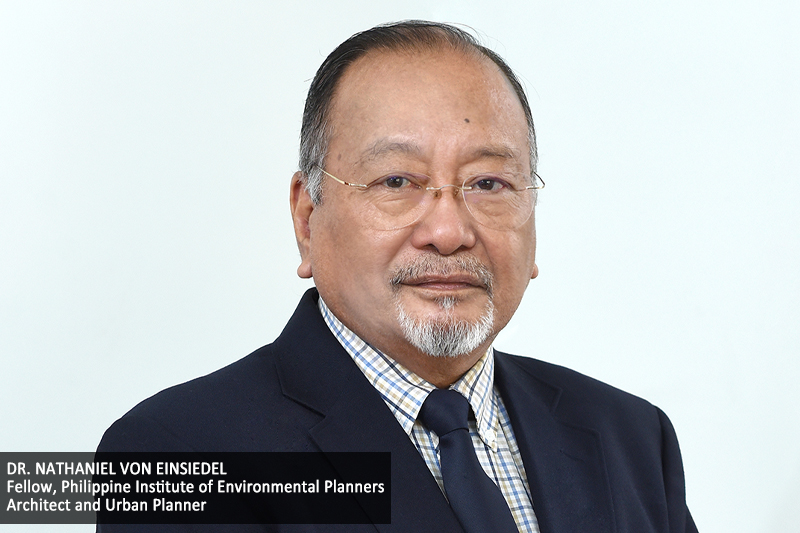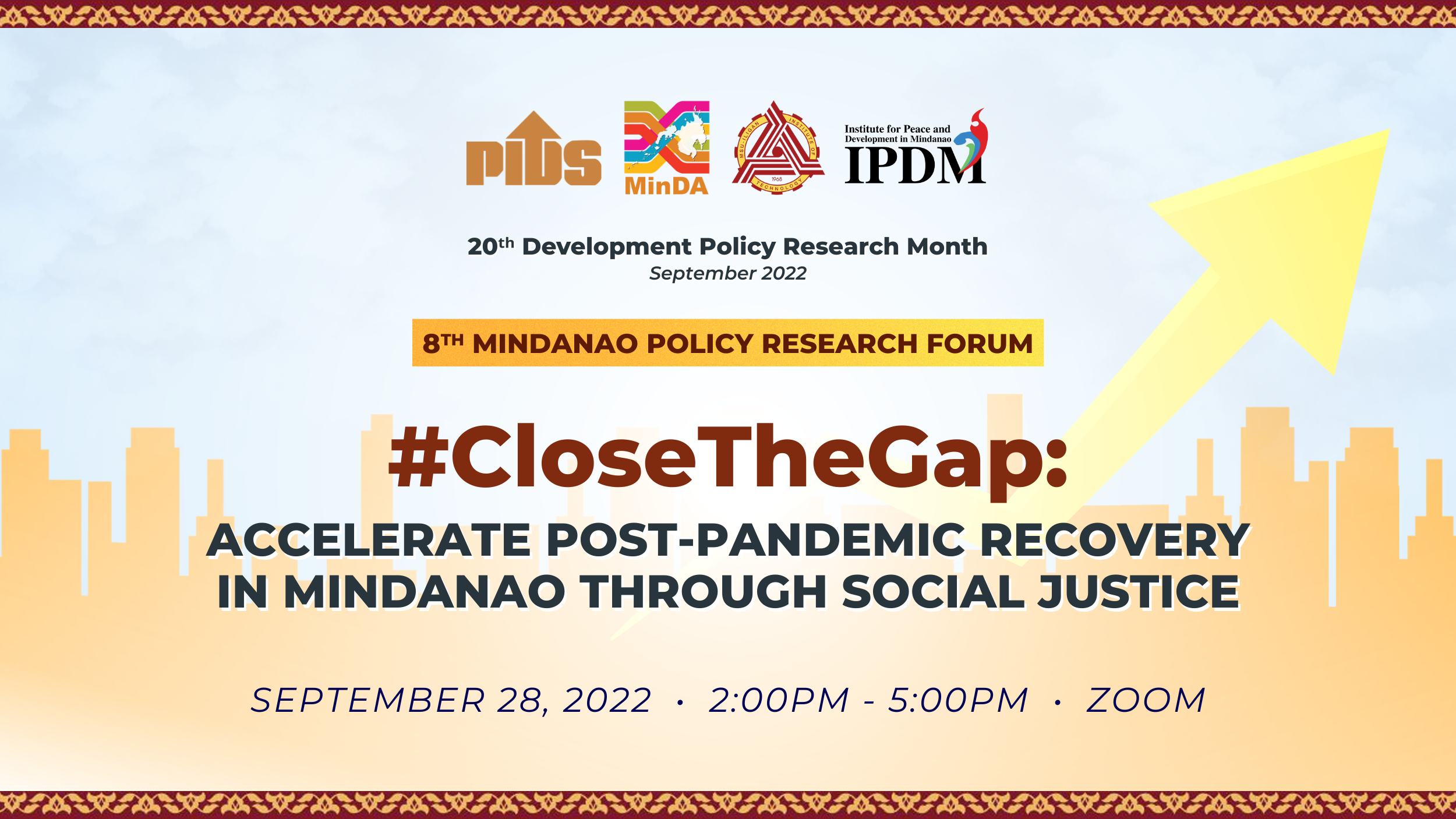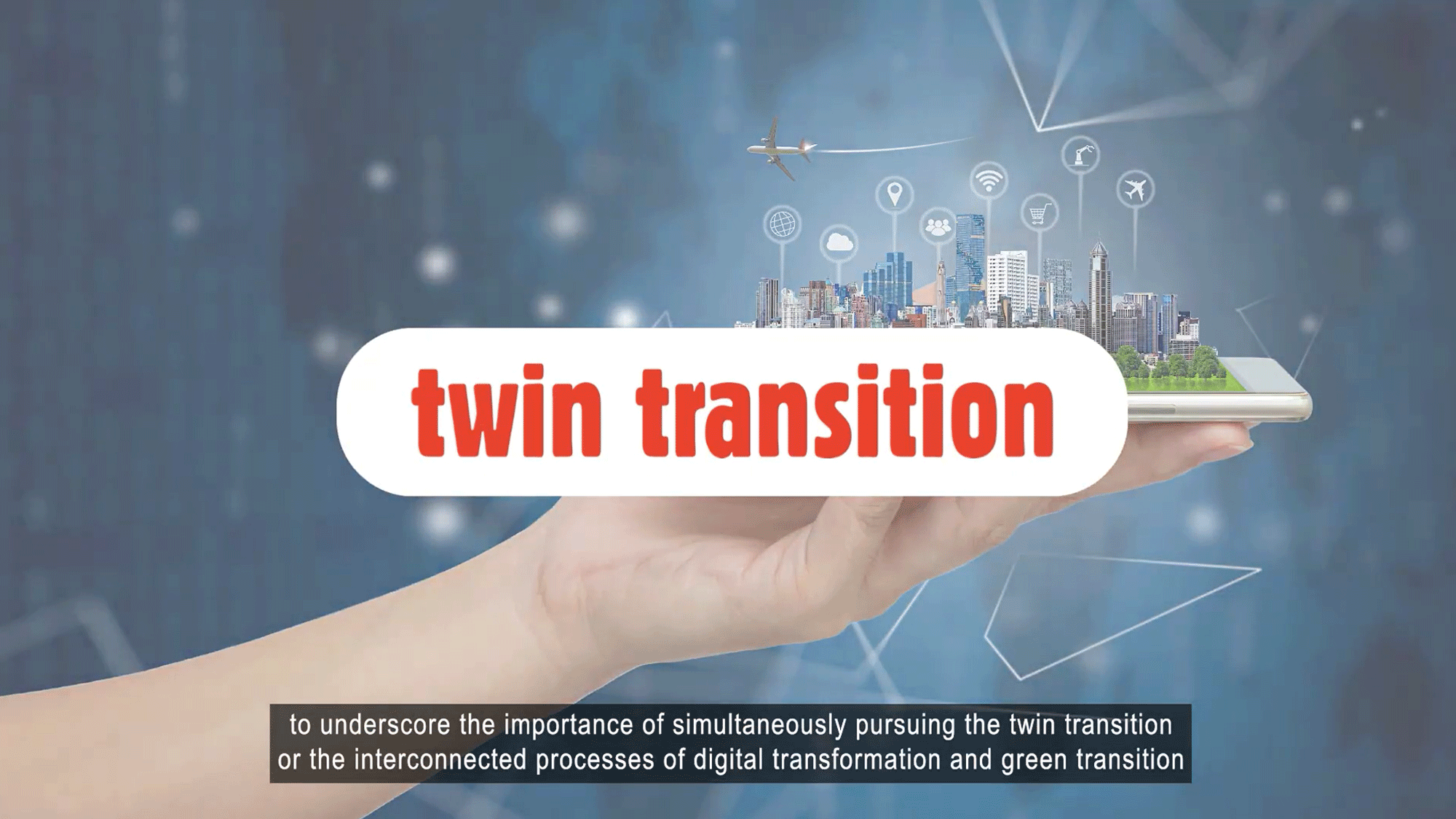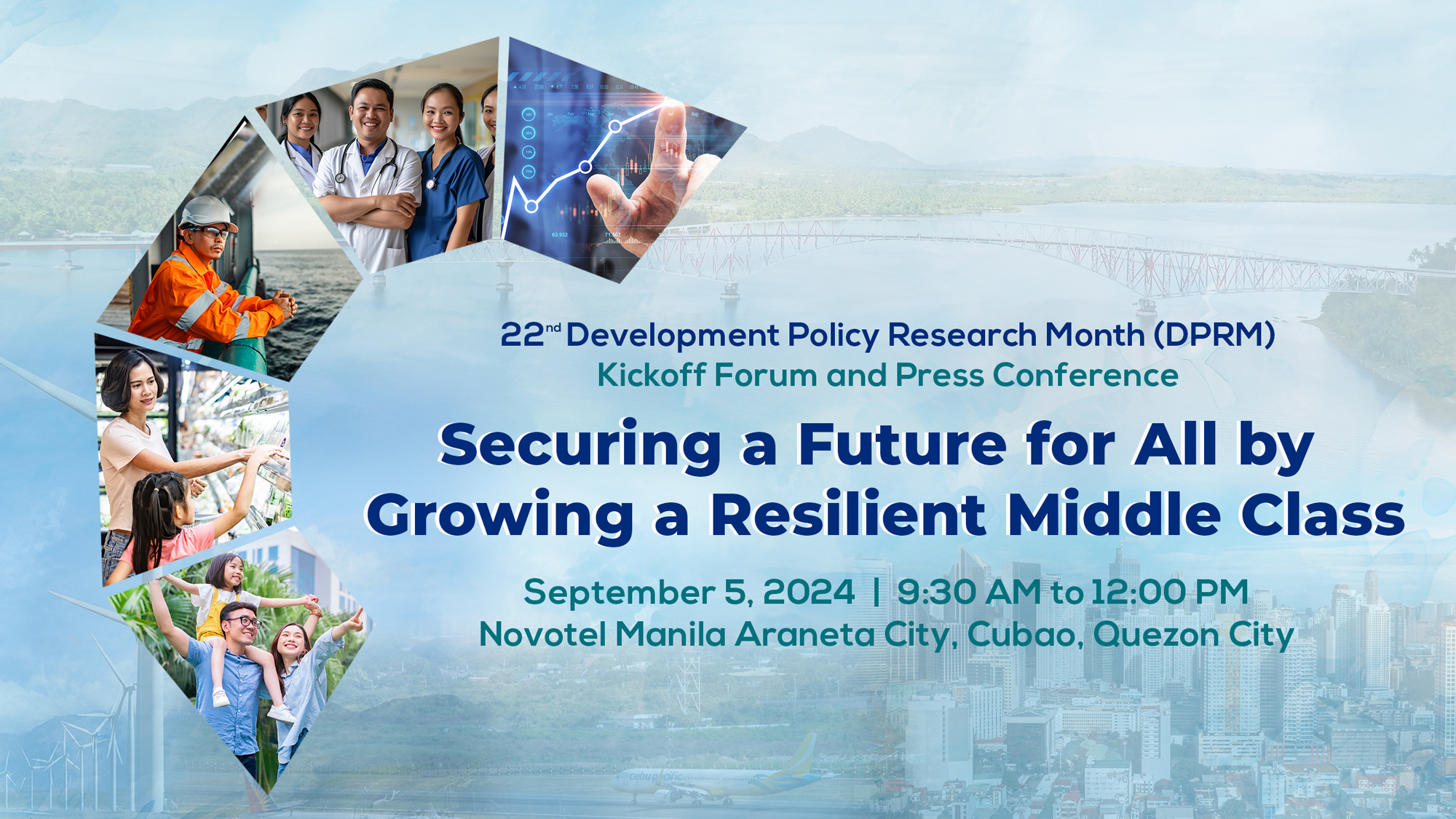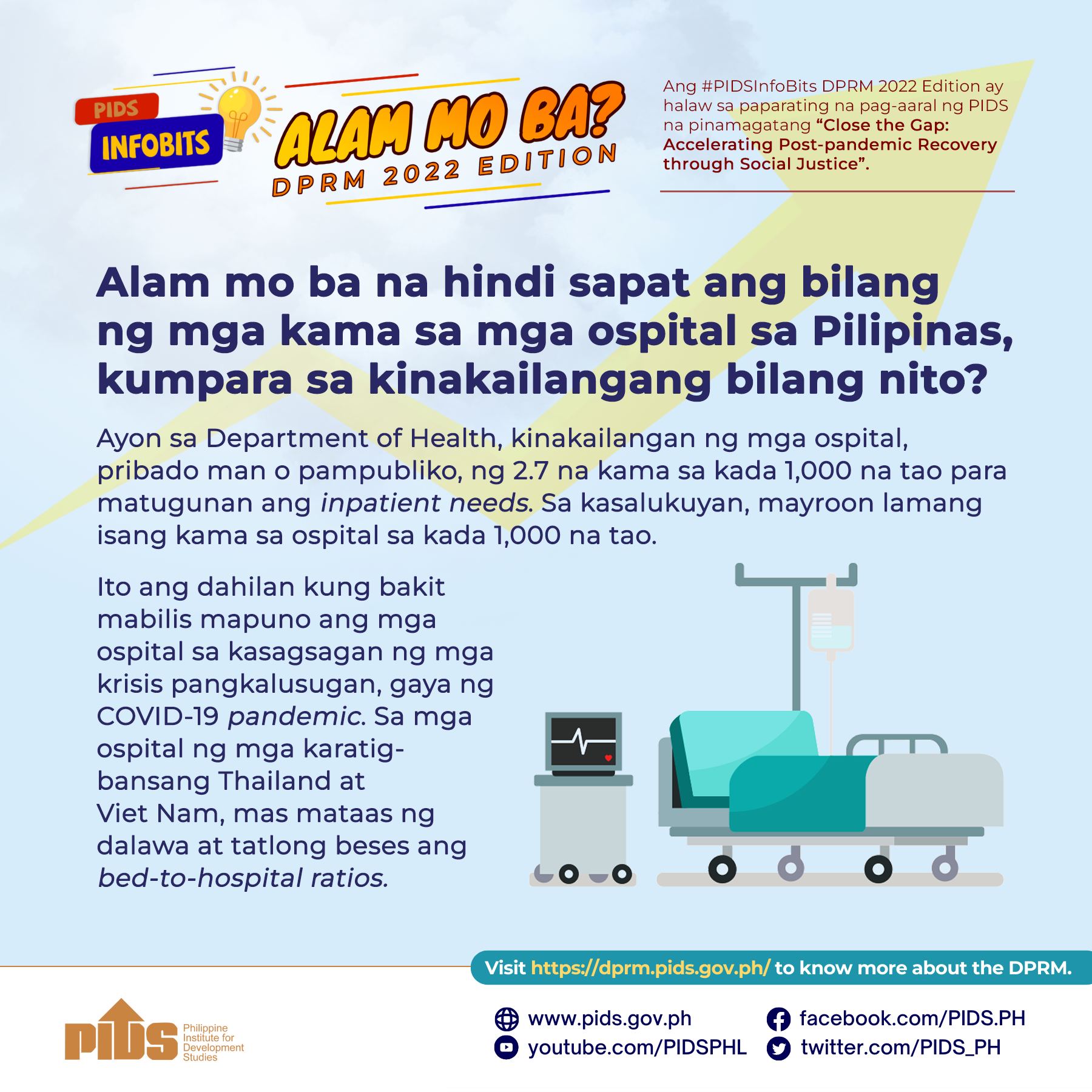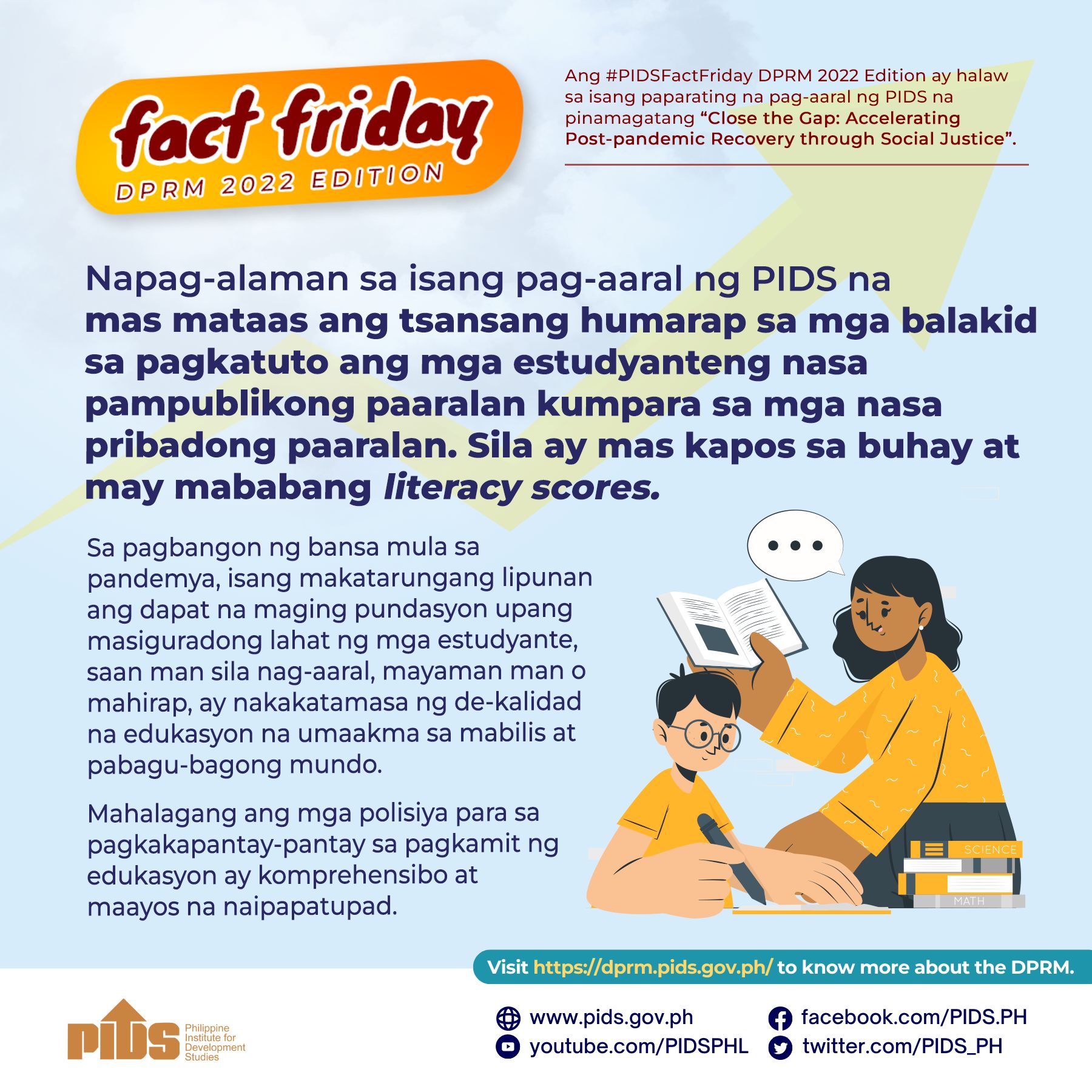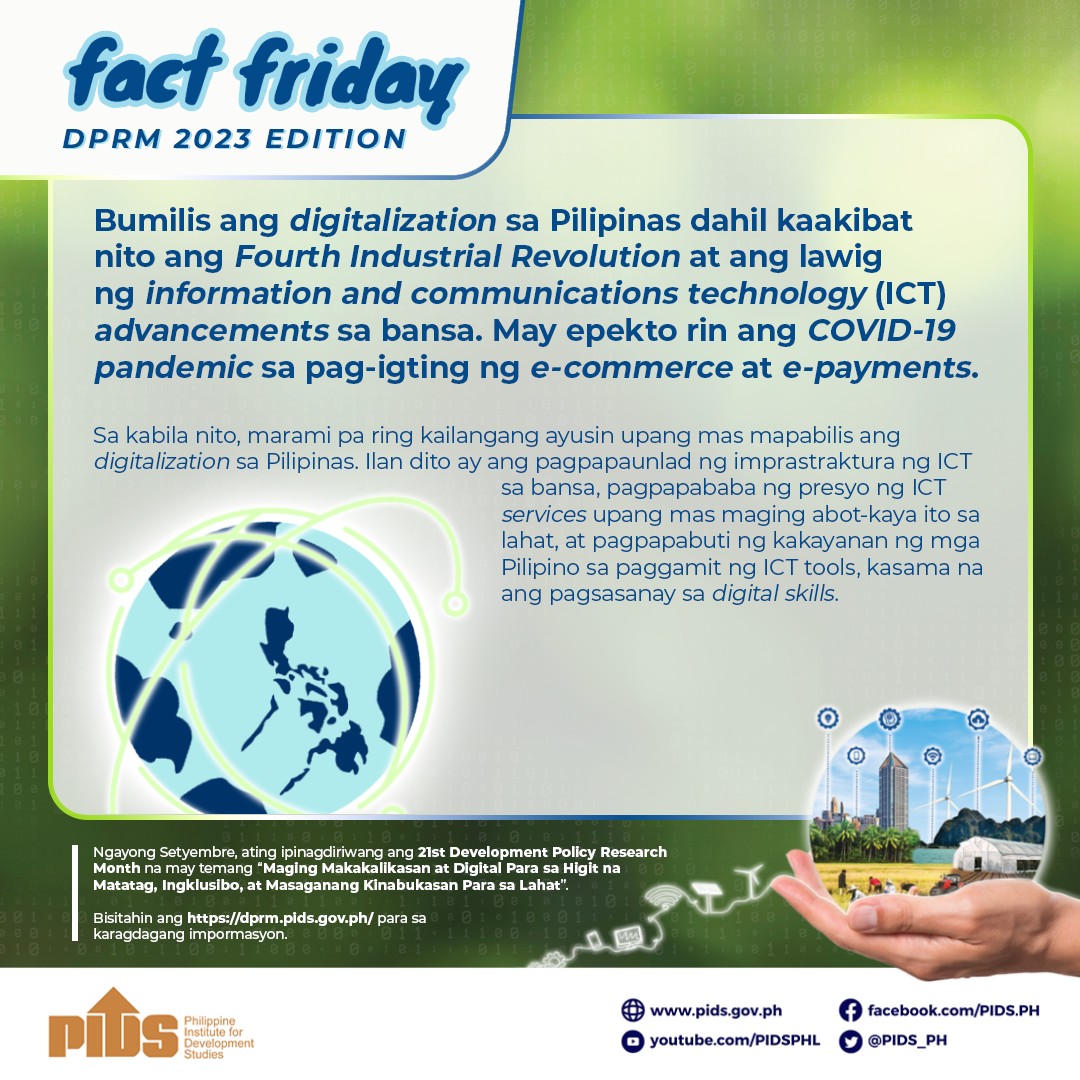DAVAO CITY—Mindanao is set to shake off its troubled past for a more sustainable and inclusive future, driven by effective policies and strong governance. The region fortified its commitment to development through the newly forged partnership between the Mindanao Development Authority (MinDA) and state think tank Philippine Institute for Development Studies (PIDS).
Capping off the first week of the 13th Development Policy Research Month, an inaugural development policy research forum - the first of its kind in Mindanao - was held last September 4 to mark the PIDS-MinDA institutional partnership. The full-day event focused on the policy research opportunities and challenges of the theme, "Advancing Mindanao: Toward Sustainable Economic Development and Balanced Ecosystems". PIDS President Dr. Gilberto Llanto and MinDA Executive Director Undersecretary Janet Lopoz signed a memorandum of understanding on behalf of their institutes, then delivered their respective remarks on the significance and the potential of the partnership. They were joined anew in a mid-day press conference together with Mindanao leaders from various sectors.
The policy forum proper began in the afternoon with a presentation from Mr. Oscar F. Picazo, PIDS senior research consultant for health, on “Green and Gold: Promoting Eco-Adventure and Cultural Tourism for Inclusive and Sustainable Growth”, followed by a presentation on “Developing Payment for Ecosystem Services Mechanism with River Basin Organizations in Mindanao” by Dr. Carmelita Martinez, a MinDA research consultant.
The forum's day of firsts was also characterized by an unprecedented gathering of representatives from academic and research institutions, government and nongovernment organizations, and the business sector, lending not only audience but also a grounded voice to enrich the open forum that followed. The discussant roster included Mr. Vicente Lao, chairperson of the Mindanao Business Council, Engr. Wendel Diangcalan, deputy executive director of the Bangsamoro Development Authority, Mr. Reynaldo Navacilla, program coordinator of the Agribusiness Program at the Ateneo de Davao University, and Mr. Rogelio Acosta, executive director of the Allay Valley Landscape Development Alliance.
The potential and promise
In his presentation, Picazo posited that picking the right development opportunities in the tourism sector would enable Mindanao to capitalize on its rich cultural, historical, and natural heritage. Mainstream tourism as observed in more popular tourist destinations like Boracay is neither sustainable nor inclusive. Green and gold tourism are the alternatives precisely because they can be owned and ran not by large corporations but by local people and communities.
Green tourism is characterized by its objectives. Instead of luxury itineraries, what green tourism offers are the opportunities to understand local communities through their history and culture, to contribute to improving the local economy, to enable protection of natural areas, and to encourage and enhance heritage and environmental preservation.
Picazo urged the audience to think of the things that they already have—their history and culture, their local economies, and the treasures of their natural environment.
At the core of capitalizing on green tourism opportunities is sustainability. Picazo shared the World Trade Organization indicators, which can be summed up in part as determining local government needs and capacities to protect and serve the interests and the safety of the area, the local community, and the tourists.
"The nature of tourism has changed," he said. "Tourism has become experiential."
A point that makes green tourism activities, like volunteer tourism in cultural preservation and eco-rehabilitation, both profitable for the community and sustainable in the long run.
Out of all the requirements of harnessing green tourism, Picazo emphasized the importance of collectively generating information. Providing information is vital not only to tourism but also to the creation of effective policies and regulation.
Earlier in her keynote address, Undersecretary Lopoz underscored the same points by saying that strengthening and empowering Mindanao's knowledge economy is just as important as the strategic alignment of governance, institution, and policies to the objective of improving the region's competitiveness and inclusiveness.
The halal industry's potential role in beefing up the region's tourism was a recurring question throughout the open forum, underscoring the under-researched aspects of integration and inclusiveness of the Muslim community into the economic fabric of Mindanao.
Llanto deplored that there is a dearth in local studies on Muslim Mindanao, including issues on tourism and Islamic banking. However, he recognized the potential and stated that further policy research on issues specific to Mindanao will definitely help facilitate good and effective governance in the region.
The value of Mindanao's heritage
Martinez's presentation introduced the payment for ecosystem services (PES) as a tool for preserving and conserving Mindanao's ecosystems. Developed by the World Bank, the PES puts a monetary value on the natural services of ecosystems, like forests providing clean air and water systems that facilitate the natural cycle. On the issue of sustainability, Martinez's study offers what may be a crucial tool in preserving Mindanao's natural heritage, going hand in hand with mechanizing its tourism industry among other growth sectors.
Mindanao's growth is constrained by inclusivity and sustainability challenges that are characterized not only by economics but also by politics and security.
Lao reminded the audience that in policymaking, whether it is for enhancing the tourism sector or for improving the business climate through reforms, Mindanao's old issues of security precludes wholesome progress. As a member of the business sector, Lao said that he and his fellow businessmen are pleased to know that the region's leaders are committed to the peace process.
His statements were supported by Engr. Diangcalan, who pointed out that all the sectors must be proactive in promoting a solid framework for peace and progress in the Bangsamoro area. He said that there is a huge potential for growth in the region as a whole if the Bangsamoro region achieves peace and security objectives.
As Undersecretary Lopoz stated earlier in the day, Mindanao's leaders and policymakers have already come to realize that they share the same ecology, just as much as they share the same fate, whether that is in being held back by the disadvantages of conflict and restrictive national regulations, or in the promise of inclusive and sustainable growth being achieved through coordinated efforts.
Llanto, for his part, emphasized the need for firm leadership and political will, and for active multisectoral involvement in framing policies and regulations.
The whole of Mindanao will have to pitch in. What the PIDS-MinDA partnership hopes to contribute to the potluck is knowledge and research evidence that can assist the region's leaders in crafting more inclusive policy decisions. ###
If you wish to learn more about the studies presented during this event, please visit this link http://dprm.pids.gov.ph/index.php/resources/ppt-presentation If you wish to learn more about other DPRM events, please visit http://dprm.pids.gov.ph for updates and media advisories.
Capping off the first week of the 13th Development Policy Research Month, an inaugural development policy research forum - the first of its kind in Mindanao - was held last September 4 to mark the PIDS-MinDA institutional partnership. The full-day event focused on the policy research opportunities and challenges of the theme, "Advancing Mindanao: Toward Sustainable Economic Development and Balanced Ecosystems". PIDS President Dr. Gilberto Llanto and MinDA Executive Director Undersecretary Janet Lopoz signed a memorandum of understanding on behalf of their institutes, then delivered their respective remarks on the significance and the potential of the partnership. They were joined anew in a mid-day press conference together with Mindanao leaders from various sectors.
The policy forum proper began in the afternoon with a presentation from Mr. Oscar F. Picazo, PIDS senior research consultant for health, on “Green and Gold: Promoting Eco-Adventure and Cultural Tourism for Inclusive and Sustainable Growth”, followed by a presentation on “Developing Payment for Ecosystem Services Mechanism with River Basin Organizations in Mindanao” by Dr. Carmelita Martinez, a MinDA research consultant.
The forum's day of firsts was also characterized by an unprecedented gathering of representatives from academic and research institutions, government and nongovernment organizations, and the business sector, lending not only audience but also a grounded voice to enrich the open forum that followed. The discussant roster included Mr. Vicente Lao, chairperson of the Mindanao Business Council, Engr. Wendel Diangcalan, deputy executive director of the Bangsamoro Development Authority, Mr. Reynaldo Navacilla, program coordinator of the Agribusiness Program at the Ateneo de Davao University, and Mr. Rogelio Acosta, executive director of the Allay Valley Landscape Development Alliance.
The potential and promise
In his presentation, Picazo posited that picking the right development opportunities in the tourism sector would enable Mindanao to capitalize on its rich cultural, historical, and natural heritage. Mainstream tourism as observed in more popular tourist destinations like Boracay is neither sustainable nor inclusive. Green and gold tourism are the alternatives precisely because they can be owned and ran not by large corporations but by local people and communities.
Green tourism is characterized by its objectives. Instead of luxury itineraries, what green tourism offers are the opportunities to understand local communities through their history and culture, to contribute to improving the local economy, to enable protection of natural areas, and to encourage and enhance heritage and environmental preservation.
Picazo urged the audience to think of the things that they already have—their history and culture, their local economies, and the treasures of their natural environment.
At the core of capitalizing on green tourism opportunities is sustainability. Picazo shared the World Trade Organization indicators, which can be summed up in part as determining local government needs and capacities to protect and serve the interests and the safety of the area, the local community, and the tourists.
"The nature of tourism has changed," he said. "Tourism has become experiential."
A point that makes green tourism activities, like volunteer tourism in cultural preservation and eco-rehabilitation, both profitable for the community and sustainable in the long run.
Out of all the requirements of harnessing green tourism, Picazo emphasized the importance of collectively generating information. Providing information is vital not only to tourism but also to the creation of effective policies and regulation.
Earlier in her keynote address, Undersecretary Lopoz underscored the same points by saying that strengthening and empowering Mindanao's knowledge economy is just as important as the strategic alignment of governance, institution, and policies to the objective of improving the region's competitiveness and inclusiveness.
The halal industry's potential role in beefing up the region's tourism was a recurring question throughout the open forum, underscoring the under-researched aspects of integration and inclusiveness of the Muslim community into the economic fabric of Mindanao.
Llanto deplored that there is a dearth in local studies on Muslim Mindanao, including issues on tourism and Islamic banking. However, he recognized the potential and stated that further policy research on issues specific to Mindanao will definitely help facilitate good and effective governance in the region.
The value of Mindanao's heritage
Martinez's presentation introduced the payment for ecosystem services (PES) as a tool for preserving and conserving Mindanao's ecosystems. Developed by the World Bank, the PES puts a monetary value on the natural services of ecosystems, like forests providing clean air and water systems that facilitate the natural cycle. On the issue of sustainability, Martinez's study offers what may be a crucial tool in preserving Mindanao's natural heritage, going hand in hand with mechanizing its tourism industry among other growth sectors.
Mindanao's growth is constrained by inclusivity and sustainability challenges that are characterized not only by economics but also by politics and security.
Lao reminded the audience that in policymaking, whether it is for enhancing the tourism sector or for improving the business climate through reforms, Mindanao's old issues of security precludes wholesome progress. As a member of the business sector, Lao said that he and his fellow businessmen are pleased to know that the region's leaders are committed to the peace process.
His statements were supported by Engr. Diangcalan, who pointed out that all the sectors must be proactive in promoting a solid framework for peace and progress in the Bangsamoro area. He said that there is a huge potential for growth in the region as a whole if the Bangsamoro region achieves peace and security objectives.
As Undersecretary Lopoz stated earlier in the day, Mindanao's leaders and policymakers have already come to realize that they share the same ecology, just as much as they share the same fate, whether that is in being held back by the disadvantages of conflict and restrictive national regulations, or in the promise of inclusive and sustainable growth being achieved through coordinated efforts.
Llanto, for his part, emphasized the need for firm leadership and political will, and for active multisectoral involvement in framing policies and regulations.
The whole of Mindanao will have to pitch in. What the PIDS-MinDA partnership hopes to contribute to the potluck is knowledge and research evidence that can assist the region's leaders in crafting more inclusive policy decisions. ###
If you wish to learn more about the studies presented during this event, please visit this link http://dprm.pids.gov.ph/index.php/resources/ppt-presentation If you wish to learn more about other DPRM events, please visit http://dprm.pids.gov.ph for updates and media advisories.

